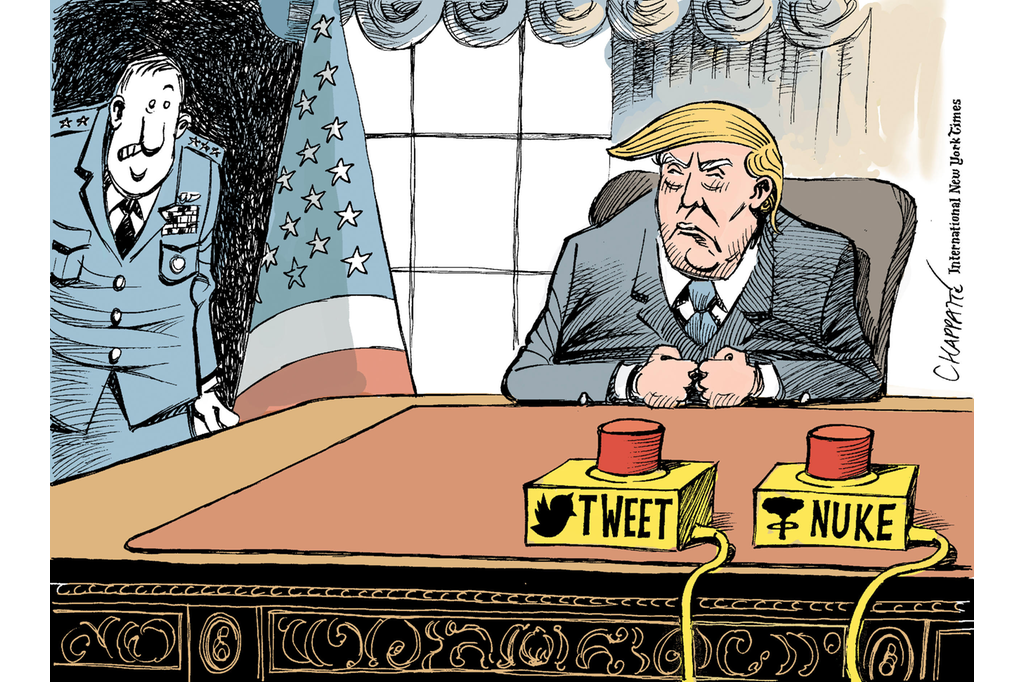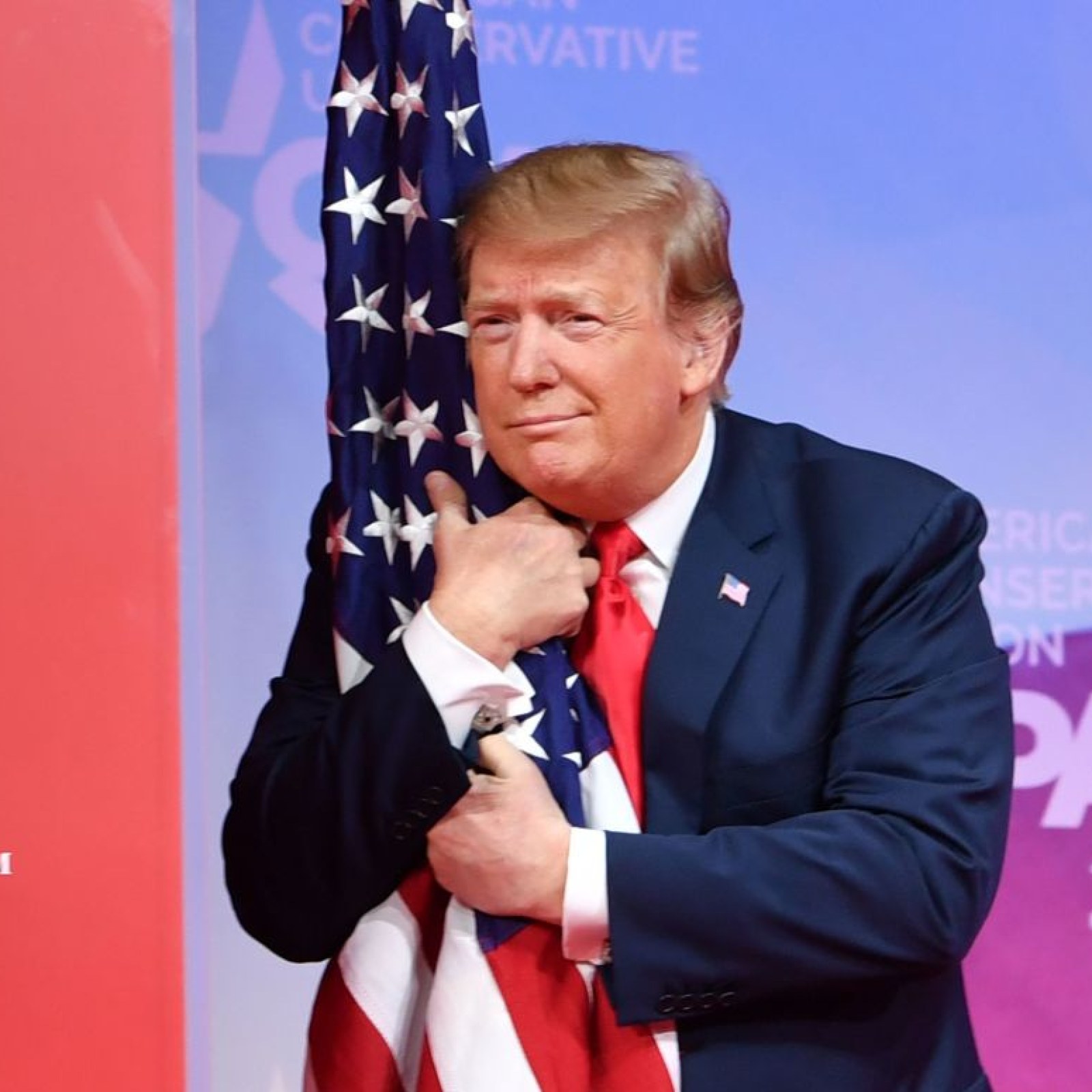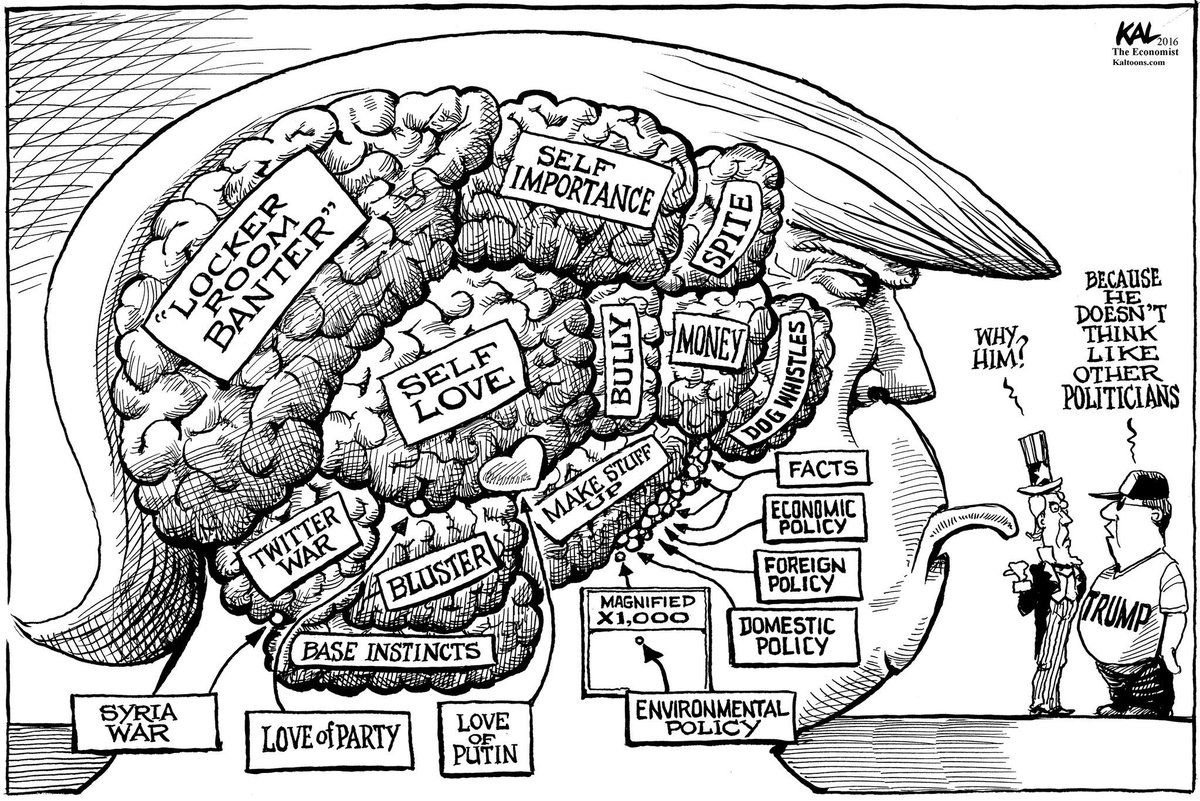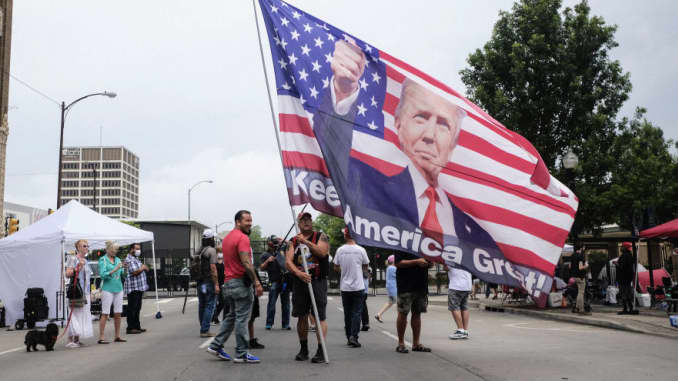 |
| https://www.nytimes.com/2020/06/20/us/politics/waiting-for-trump-hats-flags-little-fear-of-the-virus.html |
22 DAYS - daily election day countdown
This post has been on the planning table for some time.
The music does not directly pertain to the content. It's some what applicable and yet random.
In the month or so that I have been writing this post, things in the country of America have gone from worse to uncontrolled dumpster fire into which maniacs on Joker Juice are hosing in gasoline and jet engine fuel.
In the month or so that I have been writing this post, things in the country of America have gone from worse to uncontrolled dumpster fire into which maniacs on Joker Juice are hosing in gasoline and jet engine fuel.
My new cant is ... okay, maybe I should not call it a "cant" as it is not humbug and whining... or is it?
My new sound bite of analysis is that I cannot understand how any reasonable person who cares about other people and cares about our country can support Donald Trump. It's mind boggling to me that so many do and do so loudly.
And yet, the bumper sticker I keep seeing on trucks around my town may shed truth to that truth:
"TRUMP 2020: Making Liberals Cry Again."
The maniacal Trump hooting a hollering and big flag waving seems more about the malice aforethought expressed in that bumper sticker than anything else, and I think those feelings are coming out of a backlash of resentment and bitterness to eight years of a black man who is smarter, cooler, and cares more than them being in charge of the country. That made so many staunch republicans sick that they feel justified in letting their hate flags fly, and the occupant in our house loves nothing more than spraying them all down with his golden showers of hateful encouragement to righteously attack those who are perceived as against them with spite, vitriol, and an unhinged lunatic rage.
And so... here's the previously written part for which the above is preface and preamble.
This Monday's post (this very one) is less about music than it is about advancing a theory regarding Trump supporters.
I am willing to admit that I am still baking this theory, and so I might be wrong about many things, if not all of it.
And yet, it rings with the clear note of crystalline truth.
Trump supporters are loud and obnoxious about their Trump love because they are angry and mean, but they are this way because they are deeply afraid and, really, not very intelligent.
I know.
That's a HUGE judgement and possibly unfair.
So allow me to unpack it.
First off, allow me to define what I mean by "Trump Supporter" or for the sake of brevity "Trumpist."
I mean the LOUD ONES. I mean the ones who are making a spectacle of their Trumpism with shouting, flags, anger, and guns.
The MAGA zealots, which seems like all of them, but really isn't.
And so, the theory.
The theory began with the observation that many Trump supporters seem to be really loud, and not joyfully loud, but rather loud as if they are threatened, frightened, and that fear makes them angry and so they must shout and shout, wave huge flags, wear outlandish "patriotic" outfits, scream and cheer because maybe they believe that if they do not, they will not seem committed, will not seem as if they have been Born Again in Trump.
And so... here's the previously written part for which the above is preface and preamble.
This Monday's post (this very one) is less about music than it is about advancing a theory regarding Trump supporters.
I am willing to admit that I am still baking this theory, and so I might be wrong about many things, if not all of it.
And yet, it rings with the clear note of crystalline truth.
Trump supporters are loud and obnoxious about their Trump love because they are angry and mean, but they are this way because they are deeply afraid and, really, not very intelligent.
I know.
That's a HUGE judgement and possibly unfair.
So allow me to unpack it.
First off, allow me to define what I mean by "Trump Supporter" or for the sake of brevity "Trumpist."
I mean the LOUD ONES. I mean the ones who are making a spectacle of their Trumpism with shouting, flags, anger, and guns.
The MAGA zealots, which seems like all of them, but really isn't.
And so, the theory.
The theory began with the observation that many Trump supporters seem to be really loud, and not joyfully loud, but rather loud as if they are threatened, frightened, and that fear makes them angry and so they must shout and shout, wave huge flags, wear outlandish "patriotic" outfits, scream and cheer because maybe they believe that if they do not, they will not seem committed, will not seem as if they have been Born Again in Trump.
Study: Conservatives are Terrified (and That's Why They're Conservative)
~ Rebecca Watson
Transcript and links at https://www.patreon.com/posts/41033663
Also, and here's where I feel I am on very thin ice, being a Trump supporter has become an IQ test. Maybe not in 2016-2019. Maybe one can argue that some intelligent people with real critical thinking skills supported Trump in the election campaign leading up to his "victory" (not really a win at all) and in the years since.
And maybe not.
Or maybe it's not a test of raw intelligence because even Trump can select a camel from a set of pictures of animals and remember person, man, woman, camera, TV.
Maybe it's about denial, compartmentalizing, ignoring the unconscionable, hateful, dangerous, fascist, petty, absurd, and undignified stuff that spews forth from Trump's mouth and Twitter on a daily basis. If you are just unaware of all the reasons Trump is unfit for the office of the presidency or just ignore what awful and terrible things that do not become conscious to you, then you can focus on sheer adulation of the man without the messy and slippery slope of the things he says, does, and has done that his lawyers are scurrying around to hush up.
Because these loud MAGA supporters are entranced in their support for the PERSON not for policies, issues, and values.
Because the Trumpists love their Trump, and so his rallies are like the orgies of violence at the Roman Coliseum in the days of the Empire, like a rock concert, it's all cheering and frenzy and excitement fueled by sound bites of "humor" that target the persecution complex, insecurities and fears of these loud, jingoistically nutty Trumpists.
Okay, so more unpacking.
But first, the music.
[1] SEVDALIZA - GOLE BI GOLDOON
[2] Radiohead - Man Of War
[3] Massive Attack, Azekel - Ritual Spirit
[4] Arcade Fire - The Suburbs
[5] Pixies - Gouge Away (6 Music Live Room)
[6] SEVDALIZA - DARKEST HOUR
[7] Fever Ray 'Keep The Streets Empty For Me'
[8] Mama Saturn Tanerélle - Topic
[9] The Yabba - Battles
[10] FKA twigs - cellophane
[11] London Grammar Wicked Game
[12] The xx - I Dare You (Live on KEXP)
[13] The National - Bloodbuzz Ohio (Official Video)
[14] 【GUMI Eng】Riot Girl【Original Song】
[15] le tigre "riot grrrl"
[16] Le Tigre Deceptacon DFA Remix
[17] Alabama Shakes - Don't Wanna Fight (Official Video - Live from Capitol Studio A)
[18] Bruce Springsteen - Letter To You (Official Video)
[19] Regina Spektor covers Radiohead 'No Surprises' for Like A Version
[20] Pussy Riot - Police State
[21] Sonic Youth - 100%
[22] Beastie Boys HD : Sabotage ( David Letterman ) - 1994
[23] Fugazi - Waiting Room - Cleveland School of Rock
[24] Rage Against The Machine - Testify (Live At Finsbury Park, London, 2010)
For most of 2020, I have been trying to work out in my mind, given the things Trump says and does, how any intelligent person with half a brain and the ability to think critically could support this mentally ill, narcissistic sociopath who occupies our house, the people's house, the White House.
 And one explanation for that support is compartmentalization. They either ignore the hateful BS spewing from this man's pie hole, they JUSTIFY it, or they don't even know about it because they do not follow the news because it's all fake and run by the radical, liberal left. Or they just follow the propaganda "news" that feds them lies and fabrications that make the so-called liberal, "fake" left cringe every five seconds.
And one explanation for that support is compartmentalization. They either ignore the hateful BS spewing from this man's pie hole, they JUSTIFY it, or they don't even know about it because they do not follow the news because it's all fake and run by the radical, liberal left. Or they just follow the propaganda "news" that feds them lies and fabrications that make the so-called liberal, "fake" left cringe every five seconds.
Or the more frightening last option is that they actually agree with the hateful rhetoric of this deranged person.
 And one explanation for that support is compartmentalization. They either ignore the hateful BS spewing from this man's pie hole, they JUSTIFY it, or they don't even know about it because they do not follow the news because it's all fake and run by the radical, liberal left. Or they just follow the propaganda "news" that feds them lies and fabrications that make the so-called liberal, "fake" left cringe every five seconds.
And one explanation for that support is compartmentalization. They either ignore the hateful BS spewing from this man's pie hole, they JUSTIFY it, or they don't even know about it because they do not follow the news because it's all fake and run by the radical, liberal left. Or they just follow the propaganda "news" that feds them lies and fabrications that make the so-called liberal, "fake" left cringe every five seconds.Or the more frightening last option is that they actually agree with the hateful rhetoric of this deranged person.
After all it's fair to claim that not all Trumpists are bigots, but all the bigots happen to be Trumpists. Just like since I started this blog entry, not all right wing extremists are terrorists but all of our domestic terrorists are right wing extremists.
The lower IQ would seem to explain the seemingly mindless support. Lots of people (even smart ones) find simple explanations seductive. Can we reduce the cause to one factor? Must we see the world in a divisive, schema of polar opposites: this or that, either/or, black-white, red-blue, right-wrong, law and order or chaos? Much easier to simplify issues to pro and con when most issues are far too complex to oversimplify in this way. If we simply see a simple pro position and a con position and ignore all the complexity, we can pour our heart and soul into a blind faith of exultant worship of a man who paid $750 dollars in taxes in the last ten years when he didn't pay zero and doesn't give two shits for anybody but himself and his vision for the "dictator for life" that he would like to be.
And yet, people want to stay in their "opinion bubble." It's a lot like faith in God. Cleave to the faith and cast out the doubts -- meaning reject and repress -- and all of life's most troubling questions will be answered. In the face of overwhelming evidence counter to the opinion, to the faith, cleave to it up to the point of total irrationality.
Hence the exhibitionist nature of the extreme jingoism of the supporters. Loud and proud. Waving a huge flag. Wearing one's faith in the country as a patriotic uniform of team unity.
Articles below detail the psychological models of Trumpists. The following list is telling, especially for the placement of prejudice on the list. Seems to me, from casual observation, that though it was less true that all Trumpists were bigots during the 2016 campaign and shortly after, it seems that now it may be the bigots are all that he has left as supporters, though this is an unproven theory and many Trumpists would argue until out of breath that they are not bigots, even though they clearly are.
And yet, people want to stay in their "opinion bubble." It's a lot like faith in God. Cleave to the faith and cast out the doubts -- meaning reject and repress -- and all of life's most troubling questions will be answered. In the face of overwhelming evidence counter to the opinion, to the faith, cleave to it up to the point of total irrationality.
Hence the exhibitionist nature of the extreme jingoism of the supporters. Loud and proud. Waving a huge flag. Wearing one's faith in the country as a patriotic uniform of team unity.
Mental Health Experts Explain Why Trump Supporters Love Being Lied To
~ Ring of Fire
Articles below detail the psychological models of Trumpists. The following list is telling, especially for the placement of prejudice on the list. Seems to me, from casual observation, that though it was less true that all Trumpists were bigots during the 2016 campaign and shortly after, it seems that now it may be the bigots are all that he has left as supporters, though this is an unproven theory and many Trumpists would argue until out of breath that they are not bigots, even though they clearly are.
These are all the traits from the first article. Number Five also strikes me as significant. I would recast that one as "persecution complex." These are people who feel that they have been unjustly persecuted (like for eight years of the Obama administration and liberals who judge them). I have seen this for years, going back to 2000 or even older. It's the fear born from feeling threatened.
“In contrast, among voters of Hillary Clinton (when they were asked about it a week before the elections), expected gain of personal significance (should she be victorious) was weakly but significantly related to support for her benevolent but not hostile actions toward her opponents. Thus, Trump supporters seemed to be more vindictive in their expected (and actual) victory, whereas that was not the case for Clinton’s supporters.”
We need more benevolence and less vindictiveness (or none).
We need to do what we do for love and not for hate.
1. Authoritarian Personality Syndrome
2. Social dominance orientation
3. Prejudice
4. Intergroup contact
5. Relative deprivation
“In contrast, among voters of Hillary Clinton (when they were asked about it a week before the elections), expected gain of personal significance (should she be victorious) was weakly but significantly related to support for her benevolent but not hostile actions toward her opponents. Thus, Trump supporters seemed to be more vindictive in their expected (and actual) victory, whereas that was not the case for Clinton’s supporters.”
We need more benevolence and less vindictiveness (or none).
We need to do what we do for love and not for hate.
VOTE!!!
 |
| https://www.nytimes.com/2018/10/02/opinion/trumps-economy-job-approval.html |
Trump Is Still Getting His Butt Kicked In The Polls
~ Ring for Fire
 |
| https://www.wsj.com/livecoverage/protests-george-floyd-death-2020-06-20/card/MheCAc9iIP7qzpkGDfgx |


 |
| https://huntingforthompson.com/2017/02/13/narcissistic-jingoism/ |
https://www.theatlantic.com/ideas/archive/2020/04/each-briefing-trump-making-us-worse-people/609859/
In the article Sullivan addresses the difference in past presidents telling lies and Trump’s “whoppers.” He states that previous presidential liars “paid some deference to the truth—even as they were dodging it. They acknowledged a shared reality and bowed to it. They acknowledged the need for a common set of facts in order for a liberal democracy to function at all.” Meaning that past presidents always returned to reality, acknowledging the truth . . . no matter how thinly in doing so.
He points out that there is a canyon-esque divide between the accepted, normal past presidential postulations, pseudo facts, quasi truths—and President Trump’s refusal to recognize his absurd behavior, to capitulate back to reality, to face facts, to tell the truth. Instead, Trump lashes out. He raises the bar even higher (think crowd size on inauguration day, voter fraud, CNN is fake news, SNL sucks, ad infinitum).
Sullivan’s thesis for a mentally impaired president is basically summed up with this statement of his: “Trump’s lies are different. They are direct refutations of reality—and their propagation and repetition is about enforcing his power rather than wriggling out of a political conundrum. They are attacks on the very possibility of a reasoned discourse, the kind of baldfaced lies that authoritarians issue as a way to test loyalty and force their subjects into submission.”
Sullivan offers the following as a real world example of witnessing unstable mental health:
“Then there is the obvious question of the president’s mental and psychological health. I know we’re not supposed to bring this up—but it is staring us brutally in the face. I keep asking myself this simple question: If you came across someone in your everyday life who repeatedly said fantastically and demonstrably untrue things, what would you think of him? If you showed up at a neighbor’s, say, and your host showed you his newly painted living room, which was a deep blue, and then insisted repeatedly—manically—that it was a lovely shade of scarlet, what would your reaction be? If he then dragged out a member of his family and insisted she repeat this obvious untruth in front of you, how would you respond? If the next time you dropped by, he was still raving about his gorgeous new red walls, what would you think? Here’s what I’d think: This man is off his rocker. He’s deranged; he’s bizarrely living in an alternative universe; he’s delusional. If he kept this up, at some point you’d excuse yourself and edge slowly out of the room and the house and never return. You’d warn your other neighbors. You’d keep your distance. If you saw him, you’d be polite but keep your distance.

FROM PSYCHOLOGY TODAY
An Analysis of Trump Supporters Has Identified 5 Key Traits
A new report sheds light on the psychological basis for Trump's support.
Posted Dec 31, 2017
The lightning-fast ascent and political invincibility of Donald Trump has left many experts baffled and wondering, “How did we get here?” Any accurate and sufficient answer to that question must not only focus on Trump himself, but also on his uniquely loyal supporters. Given their extreme devotion and unwavering admiration for their highly unpredictable and often inflammatory leader, some have turned to the field of psychology for scientific explanations based on precise quantitative data and established theoretical frameworks.
Although analyses and studies by psychologists and neuroscientists have provided many thought-provoking explanations for his enduring support, the accounts of different experts often vary greatly, sometimes overlapping and other times conflicting. However insightful these critiques may be, it is apparent that more research and examination is needed to hone in on the exact psychological and social factors underlying this peculiar human behavior.
In a recent review paper published in the Journal of Social and Political Psychology, Psychologist and UC Santa Cruz professor Thomas Pettigrew argues that five major psychological phenomena can help explain this exceptional political event.
1. Authoritarian Personality Syndrome
Authoritarianism refers to the advocacy or enforcement of strict obedience to authority at the expense of personal freedom, and is commonly associated with a lack of concern for the opinions or needs of others. Authoritarian personality syndrome—a well-studied and globally-prevalent condition—is a state of mind that is characterized by belief in total and complete obedience to one’s authority. Those with the syndrome often display aggression toward outgroup members, submissiveness to authority, resistance to new experiences, and a rigid hierarchical view of society. The syndrome is often triggered by fear, making it easy for leaders who exaggerate threat or fear monger to gain their allegiance.
Although authoritarian personality is found among liberals, it is more common among the right-wing around the world. President Trump’s speeches, which are laced with absolutist terms like “losers” and “complete disasters,” are naturally appealing to those with the syndrome.
While research showed that Republican voters in the U.S. scored higher than Democrats on measures of authoritarianism before Trump emerged on the political scene, a 2016 Politico survey found that high authoritarians greatly favored then-candidate Trump, which led to a correct prediction that he would win the election, despite the polls saying otherwise.
2. Social dominance orientation
Social dominance orientation (SDO)—which is distinct but related to authoritarian personality syndrome—refers to people who have a preference for the societal hierarchy of groups, specifically with a structure in which the high-status groups have dominance over the low-status ones. Those with SDO are typically dominant, tough-minded, and driven by self-interest.
In Trump’s speeches, he appeals to those with SDO by repeatedly making a clear distinction between groups that have a generally higher status in society (White), and those groups that are typically thought of as belonging to a lower status (immigrants and minorities).
A 2016 survey study of 406 American adults published this year in the journal Personality and Individual Differences found that those who scored high on both SDO and authoritarianism were those who intended to vote for Trump in the election.
3. Prejudice
It would be grossly unfair and inaccurate to say that every one of Trump’s supporters have prejudice against ethnic and religious minorities, but it would be equally inaccurate to say that many do not. It is a well-known fact that the Republican party, going at least as far back to Richard Nixon’s “southern strategy,” used strategies that appealed to bigotry, such as lacing speeches with “dog whistles”—code words that signaled prejudice toward minorities that were designed to be heard by racists but no one else.
While the dog whistles of the past were more subtle, Trump’s are sometimes shockingly direct. There’s no denying that he routinely appeals to bigoted supporters when he calls Muslims “dangerous” and Mexican immigrants “rapists” and “murderers,” often in a blanketed fashion. Perhaps unsurprisingly, a new study has shown that support for Trump is correlated with a standard scale of modern racism.
4. Intergroup contact
Intergroup contact refers to contact with members of groups that are outside one’s own, which has been experimentally shown to reduce prejudice. As such, it’s important to note that there is growing evidence that Trump’s white supporters have experienced significantly less contact with minorities than other Americans. For example, a 2016 study found that “…the racial and ethnic isolation of Whites at the zip-code level is one of the strongest predictors of Trump support.” This correlation persisted while controlling for dozens of other variables. In agreement with this finding, the same researchers found that support for Trump increased with the voters’ physical distance from the Mexican border.
5. Relative deprivation
Relative deprivation refers to the experience of being deprived of something to which one believes they are entitled. It is the discontent felt when one compares their position in life to others who they feel are equal or inferior but have unfairly had more success than them.
Common explanations for Trump’s popularity among non-bigoted voters involve economics. There is no doubt that some Trump supporters are simply angry that American jobs are being lost to Mexico and China, which is certainly understandable, although these loyalists often ignore the fact that some of these careers are actually being lost due to the accelerating pace of automation.
These Trump supporters are experiencing relative deprivation, and are common among the swing states like Ohio, Michigan, and Pennsylvania. This kind of deprivation is specifically referred to as “relative,” as opposed to “absolute,” because the feeling is often based on a skewed perception of what one is entitled to. For example, an analysis conducted by FiveThirtyEight estimated that the median annual income of Trump supporters was $72,000.
If such data is accurate, the portrayal of most Trump supporters as “working class” citizens rebelling against Republican elites may be more myth than fact.This article was originally published at Raw Story.
AGAIN, the review article for the basis of this article:
https://jspp.psychopen.eu/article/view/750/html
 |
| https://www.newsweek.com/donald-trump-bring-back-nationalism-rich-lowry-book-mainstream-1470816 |
From psypost.org
New study identifies a psychological factor linked to Trump supporters’ vindictiveness
The desire to matter and feel significant among Donald Trump supporters is associated with support for hostile and vindictive actions against the president’s political rivals, according to new research published in the journal Political Psychology. In a series of studies conducted immediately before and after the 2016 election in the United States, the researchers examined how the quest for personal significance was related to confrontational intergroup behaviors................and.................
The researchers surveyed 189 supporters of Donald Trump and 305 supporters of Hillary Clinton the week preceding Election Day about how different outcomes of the election would make them feel. The participants also indicated their willingness to engage in actions against the future president and their support for hypothetical actions performed by the president against his or her political opponents.
“We asked whether they would support their elected president if, for example, he or she sued the media that criticized them, used the military to stop anti-government demonstrations, investigated political opponents’ email accounts or, in contrast, he or she demonstrated respect for their political opponents and included them in a political process,” Jaśko explained.
The researchers then repeated the study with another 217 Trump voters and 261 Clinton voters a week after the 2016 election.
“We were interested whether psychological factors such as gain of personal significance (i.e., feeling proud, strong, and important) derived from the victory of one’s political candidate or loss of personal significance (i.e., feeling humiliated, excluded, and ashamed) experienced after the defeat could predict those peaceful or aggressive reactions,” Jaśko said.
Trump supporters were more likely to approve of him taking hostile actions against his political opponents than Clinton supporters were to approve hers. The more Trump supporters thought his election would result in a gain of personal significance, the more supportive they were of his hostile actions
...........................................and..............“In contrast, among voters of Hillary Clinton (when they were asked about it a week before the elections), expected gain of personal significance (should she be victorious) was weakly but significantly related to support for her benevolent but not hostile actions toward her opponents. Thus, Trump supporters seemed to be more vindictive in their expected (and actual) victory, whereas that was not the case for Clinton’s supporters.”
 |
| https://www.ghanacelebrities.com/2015/12/09/donald-trump-is-a-legend-of-course-in-stupidity-and-jingoism/ |
 |
| http://www.progressive-charlestown.com/2016/10/how-to-you-answer-deluded-trump.html |
from psmag.com -
INSIDE THE MINDS OF HARDCORE TRUMP SUPPORTERS
New research finds the president's earliest and strongest followers embody a particularly belligerent strain of authoritarian thinking.
Given the meteoric rise of Donald Trump, and the ill-defined phenomenon known as Trumpism, it's vital that we understand the psychology that attracted Americans to the real estate mogul in the first place. Research suggests such voters are driven by a combination of racial resentment and authoritarianism.
Sociologist David Norman Smith cited both in a just-published paper, in which he argues hardcore Trump supporters "target minorities and women" and "favor domineering and intolerant leaders who are uninhibited about their biases."
And yet, there's something puzzling about that equation. If authoritarians, by definition, revere authority, why would they support an anti-establishment candidate like Trump? And why are they OK with his administration slandering bedrock American institutions as the Federal Bureau of Investigation?
A second recently published study provides an answer: There are different strains of authoritarian thinking. And support for Trump is associated with what is arguably the most toxic type: authoritarian aggression.
The study suggests the bulk of his supporters, at least in the Republican primaries, were not old-fashioned conservatives who preach obedience and respect for authority. Rather, they were people who take a belligerent, combative approach toward people they find threatening.
The notion that there are different types of authoritarians was proposed in the 1980s by University of Manitoba psychologist Robert Altemeyer, and refined in 2010 by a research team led by John Duckitt of the University of Auckland. In the journal Political Psychology, that team defined right-wing authoritarianism as "a set of three related ideological attitude dimensions."
They are:
- "Conventionalism," a.k.a. "traditionalism," which is defined as "favoring traditional, old-fashioned social norms, values, and morality."
- Authoritarian submission," defined as "favoring uncritical, respectful, obedient, submissive support for existing authorities and institutions."
- "Authoritarian aggression," defined as "favoring the use of strict, tough, harsh, punitive, coercive social control."
Duckitt and his colleagues created a survey designed to measure each of these three facets. It was measured by participants' responses to statements such as "The old-fashioned ways, and old-fashioned values, still show the best way to live" (traditionalism); "Our country would be great if we show respect for authority and obey our leaders" (submission); and "The way things are going in this country, it's going to take a lot of 'strong medicine' to straighten out the troublemakers, criminals, and perverts" (aggression).
A research team led by psychologist Steven Ludeke of the University of Southern Denmark used those scales to try to tease out why some studies link Trump support to authoritarianism, while others do not.
It discovered the problem with the latter is they tend to either heavily or exclusively focus on the "submission" dimension, which has traditionally been studied in the context of child-rearing (as in, "Do you expect your children to unquestioningly obey their elders?").
As it turns out, that's the facet of authoritarianism that has the least to do with support for Trump.
Ludeke's study, published in the journal Personality and Individual Differences, featured 1,444 participants recruited online in April of 2016. They responded to 18 authoritarianism-focused statements—six for each facet—and indicated who, among the presidential candidates remaining in the race at that point, they supported.
"Consistent with Trump's representation of the world as a dangerous place requiring harsh treatment of deviant minorities," they write, "Trump supporters were high on authoritarian aggression."
Strong support for conventionalism/traditionalism was also linked to support for Trump, but high scores on the submission category—that is, respect for authority, and obedience to superiors—was not.
Smith's analysis of data from the American National Election Study reaches a similar conclusion. He reports "enthusiastic Trump voters are also enthusiastic about domineering leaders, and that they are not especially enthusiastic about respectful children."
Authoritarianism in the Trump era "is not the wish to follow any and every authority but, rather, the wish to support a strong and determined authority who will 'crush evil and take us back to our true path,'" Smith and his co-author, Eric Hanley, conclude.
Participants in Ludeke's study also completed surveys measuring Social Dominance Orientation—the belief that one group has the right to dominate others. Replicating previous research, they found this philosophy, which often accompanies authoritarianism, correlated with support for Trump.
So the very things a majority of Americans find disconcerting, if not disqualifying, about Trump—his need to dominate, his thinly veiled white supremacism, and his blunt, bullying language—is precisely what appeals to his hardcore fans. They are very likely stand to by their man, whatever scandals might emerge.
That said, these results suggest Democrats have a decent chance of peeling away a different slice of the Republican-leaning electorate—if they can defend liberal policies while embodying a more traditional respect for authority. Those "submission"-oriented voters don't have a natural affinity for Trump. They may prefer candidates who embody a traditional sense of dignity—people they can feel comfortable looking up to.
That possibility aside, the picture painted in both of these studies is pretty bleak from a progressive perspective. Smith's paper, the lead article in the March 2018 issue of Critical Sociology, concludes this way:
Most Trump voters cast their ballots for him with their eyes open, not despite his prejudices but because of them. Their partisanship, whether positive (toward Trump and the Republicans) or negative (against Clinton and the Democrats), is intense. This partisanship is anchored in anger and resentment among mild as well as strong Trump voters.
Anger, not fear, was the emotional key to the Tea Party, and that seems to be true for Trumpism as well. If so, the challenge for progressives is greater than many people have imagined. Hostility to minorities and women cannot be wished away; nor can the wish for domineering leaders.
 |
| https://www.salon.com/2019/07/01/trump-wants-military-tanks-on-the-national-mall-for-july-4th-event/ |
https://www.politico.com/magazine/story/2019/02/16/donald-trump-support-2020-oostburg-wisconsin-chevy-chase-maryland-225161
“Sadly ... the
American dream is dead,” he said.
In the
cavernous lobby of Trump Tower, an eager supporter filled that pregnant
silence. “Bring it back!”
Sure enough,
that was Trump’s promise and the final line, the bottom line, of his candidacy:
“But if I get elected president, I will bring it back bigger and better and
stronger than ever before, and we will make America great again!”
This became
his mantra. "Make America Great Again." The premise of that motto—the
American dream is dead—carried the day in state after state, and it drew
boisterous crowds at rallies in places like Lowell, Mass.; Beaumont, Texas;
Mobile, Ala.—“We’re running on fumes. There’s nothing here."—and
Springfield, Ill.
“These rally
towns,” the Washington Post reported in an early
effort to decode Trump’s meaning, “lag behind the country and their home states
on a number of measures. Their median household incomes are lower, and they often
have lower rates of homeownership or residents with college degrees.”
 |
| https://www.npr.org/2018/10/24/660042653/what-is-a-nationalist-in-the-age-of-trump |
from thoughtco.com -
Survey Research
Reveals Stark Trends in Voters and Values
· Updated June 29, 2019
Many were shocked by Donald Trump's
rise to prominence through the 2016 Republican primaries, and even more so by
his win of the presidency. Simultaneously, many were thrilled by it. Who are
the people behind Trump's success?
Throughout the 2016 primary season, Pew Research Center regularly surveyed voters, Republican and Democrat alike, and produced a series of illuminating reports on demographic trends among supporters of particular candidates, and on the values, beliefs, and fears that drive their political decisions. Let's take a look at this data, which provides an in-depth look at the people behind Donald Trump's popularity.
Throughout the 2016 primary season, Pew Research Center regularly surveyed voters, Republican and Democrat alike, and produced a series of illuminating reports on demographic trends among supporters of particular candidates, and on the values, beliefs, and fears that drive their political decisions. Let's take a look at this data, which provides an in-depth look at the people behind Donald Trump's popularity.
More Men Than Women
Through the primaries and as
the Republican nominee, Trump was more popular among men than women. Pew found
in January 2016 that men among Republican voters had more confidence in Donald
Trump than did women, and they found that men supported him
more than women when they surveyed voters in March 2016. Once Trump and Clinton
officially faced off in the general election, the greater appeal of Trump to
men became even more clear, with just 35 percent of women voters aligning with
him.
More Old Than Young
Throughout his campaign,
Trump was consistently more popular among older voters than among younger ones.
Pew found in January 2016 that Trump's ratings among Republican voters were
highest with those 40 years and older, and this trend held true as more
voters switched to supporting him in March 2016. Pew also found in their study
conducted in April and May 2016 that warmth toward Trump increased with age,
and coldness toward him decreased. A full 45 percent of Republicans aged 18 to
29 felt coldly toward Trump, while just 37 percent felt warmly toward
him. Conversely, 49 percent of those aged 30 to 49 felt warmly toward him
and 60 percent of those aged 50 to 64 did, as did 56 percent of those over 65
years of age.
And according to Pew's data, in a face-off with Hillary Clinton, Trump was expected to capture just 30 percent of the vote among those 18 to 29 years of age. The proportion of those who preferred Trump to Clinton increased with each age bracket, but it wasn't until voters passed 65 years of age that Trump got the advantage.
And according to Pew's data, in a face-off with Hillary Clinton, Trump was expected to capture just 30 percent of the vote among those 18 to 29 years of age. The proportion of those who preferred Trump to Clinton increased with each age bracket, but it wasn't until voters passed 65 years of age that Trump got the advantage.
Less Rather
Than More Education
Trump's popularity was also
consistently greater among those with lower levels of formal education. Back in
the primary season, when Pew surveyed Republican voters and asked them which
candidates they preferred, Trump's ratings were highest among those who had not
attained a college degree. This trend remained consistent when Pew surveyed
Republican voters again in March 2016 and revealed that his
popularity was highest among those whose highest degree was a high school
diploma. This trend bears out in an examination of supporters of Trump versus
Clinton as well, with Clinton far more popular among those with higher levels
of education.
Lower Income Free Trade
Lower Income Free Trade
Trump's greater appeal to
those with less rather than more household income is unsurprising, given the
statistical relationship between education and income. While he was still
competing against other Republican
candidates in the primaries, Pew found in March 2016 that Trump
was more popular among voters with lower income levels than
among those with higher levels. At that time, his popularity was greatest among
those whose household income was below $30,000 per year. This trend gave Trump
an edge in the primaries, and perhaps over Clinton as well, because there are
more citizens living at, around, or below that income level than there are
those who live on higher incomes.
As compared with those who supported Clinton, Trump supporters are more likely to report that their household income is falling behind the cost of living (61 versus 47 percent). Even across income brackets for supporters of both candidates, Trump supporters were more likely to report this, outweighing Clinton supporters by 15 percentage points among those whose household income is $30,000 or less, eight points among those in the $30,000 to $74,999 bracket, and by 21 points among those with a household income above $75,000.
As compared with those who supported Clinton, Trump supporters are more likely to report that their household income is falling behind the cost of living (61 versus 47 percent). Even across income brackets for supporters of both candidates, Trump supporters were more likely to report this, outweighing Clinton supporters by 15 percentage points among those whose household income is $30,000 or less, eight points among those in the $30,000 to $74,999 bracket, and by 21 points among those with a household income above $75,000.
Perhaps connected to the
correlation between household income and support for Trump is the fact that his
supporters were more likely than other Republican voters in March-April
2016 to say that free
trade agreements have hurt their personal finances, and the
majority (67 percent) say that free trade agreements have been bad for the U.S.
That's a figure that was 14 points higher than the average Republican voter
during the primaries.
White People and Acculturated Hispanics
White People and Acculturated Hispanics
Pew found in a June 2016
survey of both Republican and Democratic voters that Trump's popularity lies
primarily in white people — half of whom supported Trump, while just seven
percent of black voters supported him. He was more popular among Hispanic
voters than among blacks, capturing the support of about a quarter of them.
Interestingly, Pew found
though that support for Trump among Hispanics came primarily from
English-dominant voters. In
fact, the English-dominant Hispanic electorate was closely split
between Clinton and Trump, at 48 percent for Clinton, and 41 for
Trump. Among bilingual or Spanish-dominant Hispanics, 80 percent intended
to vote for Clinton and just 11 percent indicated they would choose Trump. This
signals a relationship between one's level of acculturation —
the adoption of the dominant, mainstream culture — and voter preference. It
likely also signals a positive relationship between the number of generations
an immigrant family has been in the U.S. and preference for Trump.
Atheists and
Evangelicals
When Pew surveyed Republican
voters in March 2016, they found that Trump's popularity was greatest
among those who are not religious, and among those who are religious but do not
regularly attend religious services. At that time, he also led his opponents
among those who are religious. Curiously, Trump is especially
popular among white evangelical
Christians, who overwhelmingly believed that he would do a far
better job than Clinton on every issue.
Racial
Diversity, Immigration, and Muslims
As compared with those who
supported other Republican candidates during the primaries, Trump
supporters were more likely to believe that greater scrutiny of Muslims living
in the U.S. would make the country safer. Specifically, a Pew survey conducted
in March 2016 found that Trump supporters were more likely than those who
supported other candidates to believe that Muslims should be subjected to
greater scrutiny than other religious groups as a method of preventing
terrorism and that Islam is more likely than other religions to
encourage violence.
At the same time, the survey
of Republican voters found a strong and consistent anti-immigrant sentiment
among Trump supporters. Those who backed him in March 2016 were only half as
likely as other Republican voters to say immigrants strengthen the
country, and they were far more likely to favor building a wall along the U.S.-Mexico
border (84 percent versus 56 percent among other Republican
voters). As one can deduce from these findings, the majority of Trump
supporters view immigrants as a burden to the country, see them as a threat to
U.S. values, and favor the expulsion of undocumented immigrants.
Consistent with these
findings, Pew's April-May 2016 survey also found that the heavily older, white
male fanbase of Trump believed that the growing racial diversity of the nation,
which will make the population a majority of racial minorities, is bad for the
country.
Trump Will
Make America Great Again
Trump supporters have high
expectation for their candidate. A Pew survey conducted between June and July
2016 found that the majority of Trump supporters believed that as a president
he would make the immigration situation
"a lot better," and even more believed that he would improve it a
little. Together, that means 86 percent of Trump's supporters believed that his
policies would improve immigration (presumably by lessening it). They also
overwhelmingly believed that a Trump presidency would make the U.S. safer from
terrorism and improve the economy.
But They Do
Not Actually Like Him
Fewer than half of Trump
supporters ascribed any positive traits to their chosen candidate, according to
a June-July 2016 Pew survey. Very few consider him well-informed or admirable.
Only a minority expected that he would be willing to work with those he
disagrees with, that he could unite the country, and that he is honest. They did, however,
feel that he has deeply-held beliefs and that he is extreme.
The Big
Picture
This set of facts, culled
from a series of surveys conducted by one of the U.S.'s most respected public
opinion research centers, leaves us with a clear picture of those behind
Trump's rise to political prominence. They are primarily white, older men with low
levels of education and income. They believe that immigrants and free trade
deals have harmed their earning power (and they're right about the free trade
deals), and they prefer an America in which white people are the majority.
Trump's worldview and platform seem to
resonate with them.
Yet, following the election,
exit poll data shows that Trump's appeal was far broader than polling and
voting during the primaries suggested. He captured the votes of the vast
majority of white people, regardless of age, class, or gender. This racial division
in the electorate further played out in the ten days following the election,
when a surge of hate crimes, fueled by an embrace of Trump's rhetoric, swept
the nation.
Sources
Doherty,
Carroll. "A Wider Ideological Gap Between More and Less Educated Adults."
Pew Research Center, April 26, 2016.
"January
2016 Political Survey." Pew Research Center, January 7-14, 2016.
"June
2016 Voter Attitudes Survey." Pew Research Center.
"March
2016 Political Survey." Pew Research Center, March 17-26, 2016.
:max_bytes(150000):strip_icc():format(webp)/fa-58b893193df78c353cc25495.jpg)
https://www.wonkette.com/the-state-of-the-republican-party-is-f-cking-delusional
++++++++++++++++++++++++++++++++++++++++++++++++++++++++++++++++++++
+++++++++++++++++++++++++++++++++++++++++++++++++++++++++++++++++++++++
+++++++++++++++++++++++++++++++++++++++++++++++++++++++++++++++++++++++
- Bloggery committed by chris tower - 2010.12 - 10:10
- Days ago = 1928 days ago
- New note - On 1807.06, I ceased daily transmission of my Hey Mom feature after three years of daily conversations. I plan to continue Hey Mom posts at least twice per week but will continue to post the days since ("Days Ago") count on my blog each day. The blog entry numbering in the title has changed to reflect total Sense of Doubt posts since I began the blog on 0705.04, which include Hey Mom posts, Daily Bowie posts, and Sense of Doubt posts. Hey Mom posts will still be numbered sequentially. New Hey Mom posts will use the same format as all the other Hey Mom posts; all other posts will feature this format seen here.



No comments:
Post a Comment